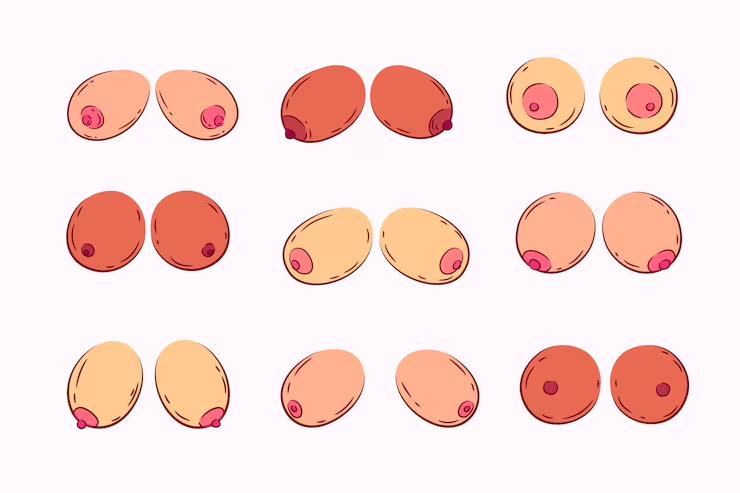Your boobs feel *soft* but also *heavy*. Tender but also strangely firm. Sensitive in a “don’t touch me” way, but also warm, full, and a little more… present. If you’ve ever grabbed your own chest in the bathroom and thought, “Why do my boobs feel like fluffy pillows and hard bricks at the exact same time?” — welcome to the luteal phase.
Breast changes in this part of the cycle are extremely common. They can affect your mood, your confidence, your comfort, and yes — your sex life. Let’s break down what’s actually happening behind the scenes.
The Hormonal Truth: Your Boobs Are Preparing for a Possible Pregnancy

It doesn’t matter whether you’re trying to conceive or not — after ovulation, your body goes into “just in case” mode. The star of the show is progesterone, which rises significantly after ovulation.
Progesterone can cause:
- Breast swelling as milk ducts expand
- Fluid retention inside breast tissue
- Fullness or heaviness (the “brick”)
- Soft, plush tenderness (the “pillow”)
- Extra sensitivity to touch and temperature
Add a small dip in estrogen mid-luteal phase and your boobs can feel like they’re changing texture by the hour.
So… Why the “Pillow + Brick” Effect?

Your breasts are made of three main tissues:
- Fatty tissue → makes breasts feel soft and cushiony
- Glandular tissue → becomes fuller and denser before your period
- Fluid and lymph → increases due to hormonal shifts
When progesterone spikes, the glandular tissue swells while the fatty tissue stays soft. That’s why you can squeeze your boobs and feel:
- Softness on the outside
- Firm pressure deeper in the tissue
- Tightness or fullness on the sides
- Soreness near the nipples
It’s a hormonal two-texture cocktail — totally normal, totally common.
How This Affects Your Emotions & Confidence
Luteal-phase breasts can make you feel:
- More self-conscious about clothes fitting tighter
- More aware of movement (stairs, jogging, turning too fast… ouch)
- More sensitive emotionally (yes, boob pain can trigger tears)
- More sensual or curvier — and sometimes more attractive
For some, the fullness feels sexy. For others, the heaviness feels frustrating. Both reactions are okay.
Sex, Touch, and “Please Don’t Grab Them Like That” Moments
Breast sensitivity can dramatically change how you want to be touched during the luteal phase. Many women report:
- More sensitivity around the nipples — sometimes too sensitive
- Prefer gentle touch instead of squeezing or pressure
- A slower warm-up before any breast play feels good
- A desire for emotional intimacy over intense stimulation
If you have a partner, it’s okay to say:
- “They’re tender today — go slow.”
- “Touch is okay, just softer.”
- “Focus on other areas for now.”
- “That pressure hurts — try cupping them gently instead.”
Breast sensitivity doesn’t mean your sex drive disappears — it just means your body needs a different style of intimacy.
How Bras, Clothes, and Daily Life Suddenly Feel Like Attacks
When the luteal phase hits hard, simple daily movements can feel exaggerated:
- Your bra feels too tight (even the comfy one)
- Your shirt brushes your nipples wrong
- You avoid big hugs because “ouch”
- Running suddenly feels like a bad idea
- Even rolling over in bed can pull the tissue painfully
Switching to soft bras, bralettes, or no bra at home can make a huge difference.
Pregnancy vs PMS: How to Tell the Difference
Heavy, sore breasts are a symptom of both:
- Luteal-phase PMS
- Early pregnancy
Pregnancy-leaning signs include:
- Nipple darkening
- More pronounced veins
- Sensitivity that lasts past your expected period
- Breasts that stay “full” instead of deflating as bleeding approaches
PMS-leaning signs include:
- Boobs flatten or feel less swollen right before your period
- Tenderness fades as bleeding begins
If you're unsure or period is late, a pregnancy test is the clearest answer.
What Helps Soothe Luteal-Phase Boob Pain?
Try these gentle, effective options:
- Warm showers or warm compresses
- Magnesium supplements (if safe for you)
- Reducing caffeine for a few days
- Soft, wireless bras or supportive bralettes
- Sleeping on your side or with a pillow for support
- Staying hydrated (helps reduce fluid retention)
Supporting your breasts physically can also support your emotional comfort — pain affects mood, and relief restores balance.
When to See a Healthcare Provider
Check in with a doctor if you notice:
- One breast changes dramatically in size or shape
- New lumps that don’t shift with your cycle
- Redness, severe pain, or fever
- Nipple discharge unrelated to stimulation
- Pain that interferes with daily life
Most luteal-phase breast changes are normal, but trust your intuition — if something feels “off,” get it checked.
Key Takeaway: You’re Not Imagining It — Your Boobs Really Are Doing the Most
When your breasts feel like soft pillows and firm bricks at the same time, it’s not random — it’s your hormones preparing your body, shifting tissues, and increasing sensitivity.
Your boobs may feel different, but they’re not betraying you. They’re responding to your cycle exactly as they’re meant to.
Honor them. Support them. And remember: this phase is temporary — but totally normal.


